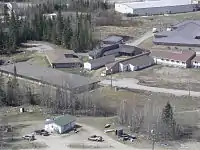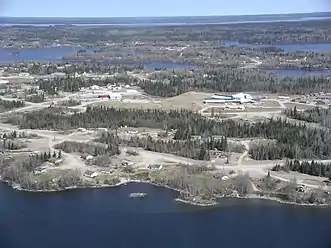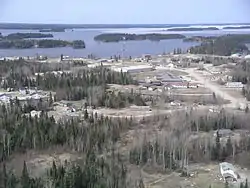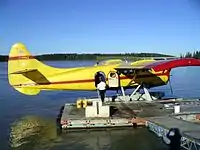Island Lake, Manitoba
Island Lake is a small community in northeast Manitoba, Canada. The community consists of an archipelago near the north shore of Island Lake which includes the following islands: Red Sucker Lake, Garden Hill, Wasagamack, St Theresa point .[2]
Island Lake | |
|---|---|
Unincorporated community | |
 Aerial view of the community | |
 Island Lake Location of Island Lake | |
| Coordinates: 53°51′56″N 094°39′06″W | |
| Country | Canada |
| Province | Manitoba |
| Area | |
| • Land | 1.99 km2 (0.77 sq mi) |
| Population (2016)[1] | |
| • Total | 91 |
The community is located 297 km (185 mi) southeast of Thompson, Manitoba and 610 km (380 mi) northeast of Winnipeg, Manitoba. Other nearby communities on the lake are Garden Hill, St. Theresa Point, and Wasagamack. The community is served by the Island Lake Airport.
The community of Island Lake consists of several government and private agencies such as a Royal Canadian Mounted Police detachment,[3] a Manitoba Conservation office, Government of Manitoba (who operates the airport), Stevenson Island School (Frontier School Division), Bell MTS, Manitoba Hydro office, the North West Company, which operates the Northern Store, several small convenience stores and Island Lake Lodge, a fly fishing lodge on Stevenson Island.
Perimeter Aviation has daily service to Island Lake from Winnipeg James Armstrong Richardson International Airport using Bombardier Dash 8 and Fairchild Swearingen Metroliners. They also have a Medevac Base on Stevenson Island serving the community 365 days a year.
Climate
With 21.11 hours of fog annually, Island Lake is one of the least foggy places in Canada. Only Penticton, British Columbia, gets less fog during the year, and no one gets less fog in February when Island Lake averages a mere 0.67 hours.
Island Lake has a subarctic climate (Dfc) with mild, rainy summers and severely cold winters.
| Climate data for Island Lake | |||||||||||||
|---|---|---|---|---|---|---|---|---|---|---|---|---|---|
| Month | Jan | Feb | Mar | Apr | May | Jun | Jul | Aug | Sep | Oct | Nov | Dec | Year |
| Record high °C (°F) | 5.9 (42.6) |
7.5 (45.5) |
16.2 (61.2) |
29.2 (84.6) |
32.2 (90.0) |
37.3 (99.1) |
35 (95) |
32.3 (90.1) |
30.4 (86.7) |
21.7 (71.1) |
15 (59) |
4.4 (39.9) |
37.3 (99.1) |
| Average high °C (°F) | −17.7 (0.1) |
−12.4 (9.7) |
−3.8 (25.2) |
5.6 (42.1) |
13.7 (56.7) |
19.5 (67.1) |
22.5 (72.5) |
21.1 (70.0) |
13.5 (56.3) |
5.7 (42.3) |
−4.9 (23.2) |
−14.8 (5.4) |
4 (39) |
| Daily mean °C (°F) | −22.9 (−9.2) |
−18.6 (−1.5) |
−10.8 (12.6) |
−0.8 (30.6) |
7.7 (45.9) |
14 (57) |
17.5 (63.5) |
16.4 (61.5) |
9.5 (49.1) |
2.6 (36.7) |
−8.3 (17.1) |
−19.4 (−2.9) |
−1.1 (30.0) |
| Average low °C (°F) | −28.1 (−18.6) |
−24.8 (−12.6) |
−17.8 (0.0) |
−7.1 (19.2) |
1.5 (34.7) |
8.4 (47.1) |
12.5 (54.5) |
11.6 (52.9) |
5.5 (41.9) |
−0.6 (30.9) |
−11.6 (11.1) |
−23.9 (−11.0) |
−6.2 (20.8) |
| Record low °C (°F) | −45 (−49) |
−43.3 (−45.9) |
−42.2 (−44.0) |
−28.9 (−20.0) |
−16.6 (2.1) |
−1.9 (28.6) |
2.2 (36.0) |
2.2 (36.0) |
−4.4 (24.1) |
−13.4 (7.9) |
−34.8 (−30.6) |
−43.3 (−45.9) |
−45 (−49) |
| Average precipitation mm (inches) | 20.1 (0.79) |
18.6 (0.73) |
24 (0.9) |
26.2 (1.03) |
42.8 (1.69) |
69.1 (2.72) |
89.4 (3.52) |
77.4 (3.05) |
61.8 (2.43) |
55.8 (2.20) |
36.3 (1.43) |
24.4 (0.96) |
546.2 (21.50) |
| Source: Environment Canada[4] | |||||||||||||
Demographics
In the 2021 Census of Population conducted by Statistics Canada, Island Lake had a population of 54 living in 21 of its 66 total private dwellings, a change of -31.6% from its 2016 population of 79. With a land area of 3.54 km2 (1.37 sq mi), it had a population density of 15.3/km2 (39.5/sq mi) in 2021.[5]
Gallery
 Garden Hill Health Centre
Garden Hill Health Centre Garden Hill
Garden Hill Garden Hill First Nations
Garden Hill First Nations Island Lake Lodge dock
Island Lake Lodge dock
References
- "Census Profile, 2016 Census, Statistics Canada – Validation Error".
- https://www.gov.mb.ca/inr/publications/community_profiles/pubs/island-lake-2016.pdf
- Government of Canada, Royal Canadian Mounted Police (14 July 2015). "Island Lake detachment – Manitoba". rcmp-grc.gc.ca. Retrieved 18 August 2021.
- Environment Canada—Canadian Climate Normals 1971–2000, accessed 27 April 2010
- "Population and dwelling counts: Canada and designated places". Statistics Canada. 9 February 2022. Retrieved 3 September 2022.